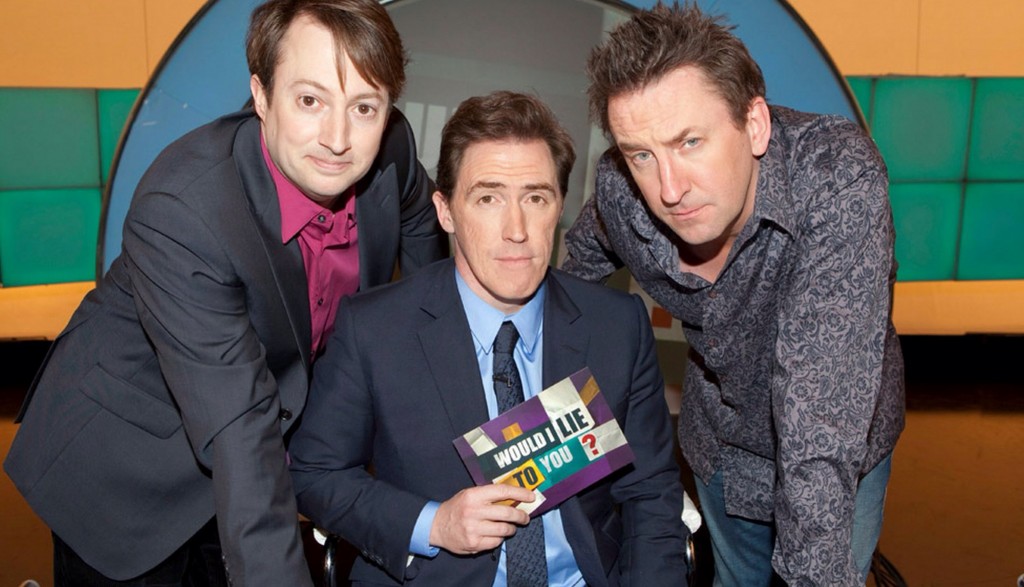Where did it all go wrong for panel shows?
Rob Gilroy on comedy panels shows, and whether there should be more right-wing acts on TV.

Panel shows. What a load of rubbish, am I right? A bunch of people sat behind a big desk sprouting nonsense.
I saw this history-based one the other night – A Question of Time or something – and let me tell you now – no one said anything remotely funny. They even had this odd audience interaction bit and, aside from seeing cripplingly middle class people trying to handle public speaking, it offered very little in the way of merriment. Yet I guarantee that the BBC will decide to re-commission it. There’s no justice.
Why do channels insist of creating these vapid shows? Is it because they’re funny? They’re popular? They make money? Yes. Yes, I’d say that’s exactly it. Fair enough, I suppose.
There’s always a lot of discussion surrounding panel shows – are there enough women appearing? Are they swinging so far to the left that the BBC pays them in lentils? Are they deeply offensive and ignorant towards minority groups such as well off, middle class, white politicians?
Thankfully, Andrew Lawrence stepped up the other week to clarify this. His resounding answer to these questions seemed to be a ‘yes’, although he was quite coy about his true feelings.
Initially, I was going to write about his desire to have more right wing comics on these shows. It seemed like a fair comment – not just in a ‘let’s be balanced’ BBC way, but also because it does open up shows to other opinions and, crucially, other comedic minds. Then I realised there isn’t much point in sharing the stage with right wing comics as, and I’m slightly generalising things here, right wing views are horrible views.
Whichever way you look at it, right-leaning views seem to stem from the foundation that people should be graded in levels of importance. While most right-of-centre supporters have wised up to the fact that they should sugar coat their opinions with a layer of faux-equality, you can’t ignore the fact that they seem to treat the human race as just that, a competition.
Everyone is vying for the top spots and, if you can’t reach them, then frankly you’re not worth worrying about. So no, I don’t need a side order of bigotry with my panel shows.
For me though, the bigger issue with panel shows is that they don’t offer the level of creative freedom you might expect. It seems to me, they place greater emphasis on covering their backs than making something funny.
We’ve all heard how a half hour show can have a recording that lasts well over two hours and I suppose that’s understandable. Everyone can’t be firing on all cylinders at all times – I usually hit my peak at 9am then it’s a gentle decline until bed – so allowing them an entire evening to warm up and be funny, then picking the choice bits, seems to me to be a sensible way of insuring that most people have a turn in the spot light.
However, what seems odd is that these shows sometimes smother a comedian’s chances of being naturally funny. Anybody who’s been in the honourable situation of sharing a green room with a bunch of comedians will tell you that, away from the stage, comedians are actually miserable bastards. Proper shits. But give them an audience and they light up.
Even without prewritten material, they can be funny, quick and they can bounce off other people. It sort of comes with the job. That’s why comedians dealing with hecklers always get a huge response. The audience can see they don’t need the material to generate laughs. So to take these naturally gifted performers and give them a quota of ‘banter’ targets seems a tad counterintuitive.
The other night I caught an episode of Would I Lie to You? Now, I like this show. I have a lot of time for it but whenever a new series starts I can’t really muster up the effort to watch it because it’s just another panel show. How stupid of me.
Would I Lie to You? – and I mean this most sincerely – is possibly the funniest show on television. I’m not saying it’s the best, I’m not saying it breaks more genre conventions than Jean-Luc Godard setting fire to an HMV, I just mean it’s funny. Reliably funny. At least twice an episode I guffaw loudly and the rest of the time I’m chuckling along to the untruthful hijinks.
The reason for this is because the show gives funny people a platform to do just that, be funny. Then, it stands back and lets them get on with it. It’s as close as you can get to being privy to a conversation between some hilarious friends. A lot of panel shows could learn from it.
Don’t have overly complicated games or rounds that attempt to let people fire off well-honed one-liners as if they’re organic, just let funny people – of all colours, genders and sexualities, Andrew – be funny.
Of course, I would love to see fewer panel shows in favour of more scripted comedy but if you’re going to do them – and they are – then get them right. And a big part of getting it right, is risking it going wrong.



































